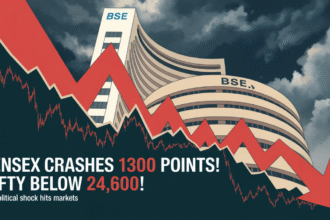Indian stock markets faced one of their biggest drops this year on June 13, 2025. The Sensex fell 1,337 points, hitting a low of 80,767, while the Nifty 50 slipped by 280 to 341 points, going below the key level of 24,600, trading between 24,547 and 24,607. The fall was seen across the board — around 2,547 stocks went down, while only 592 went up on the BSE, showing widespread selling.
The main reason behind this sharp fall was the rising tension between Israel and Iran. Israel’s military attack on Iran’s key nuclear and military sites raised fears of a bigger conflict in the Middle East. This global worry led many investors to sell risky assets like stocks and move their money to safer options. As a result, oil and gold prices jumped, while concerns grew that higher oil prices may fuel inflation in countries like India.
Besides this, there was also a global wave of selling. The drop was not limited to India — investors across world markets became more cautious. Worries over global trade tensions, US tariffs, and interest rate changes added to the nervousness. The fact that most Indian stocks were falling shows that this was not limited to a few sectors, but affected the whole market.
Compared to recent drops, this one stands out. On June 12, the Sensex had already fallen by 823 points, and Nifty had dropped below 24,900 due to similar global worries. Back in April 2025, US tariff concerns caused markets to fall by 700 points. What makes today’s crash worse is that several negative factors came together — fresh geopolitical tensions, rising oil prices, inflation fears, and global market worries.
For investors, market ups and downs may continue in the short term. The future direction depends largely on what happens in the Middle East conflict. Oil prices are now a key indicator for how the markets will react. In such times, some investors may shift to safe options like gold, US bonds, or the US dollar. However, such sharp market falls may also give opportunities to buy strong companies at lower prices for those who invest for the long term.
Until we get more clarity on the geopolitical situation and global economic signals, many investors are likely to stay cautious.

